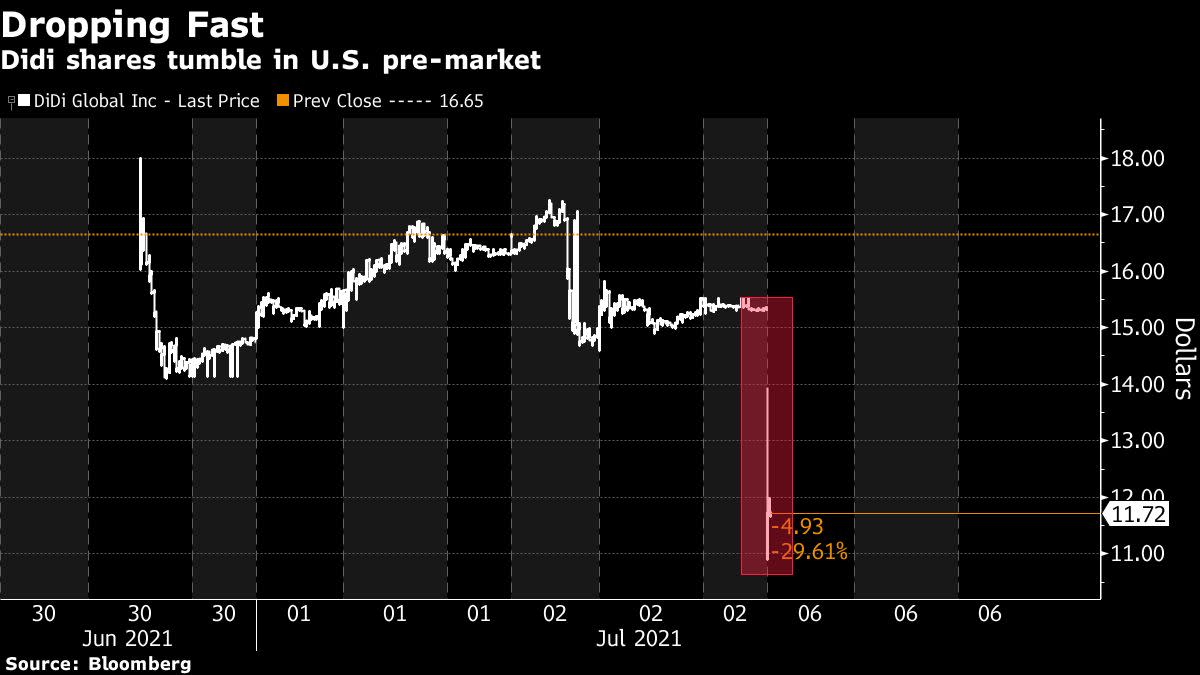Didi Plunges Below IPO Price as China Crackdown Brings U.S. Pain

(Bloomberg) — Didi Global Inc. plunged in premarket trading after a Chinese regulator ordered the removal of the company’s platform from app stores, days after a $4.4 billion initial public offering in the U.S.
Shares of the China-based tech firm fell as much as 30% to $10.90, wiping out about $22 billion of market value and taking the stock below its $14 IPO price. They traded at $12.50 as of 8:06 a.m. in New York.
The Cyberspace Administration of China barred new users from Didi’s app, citing security risks and tightening its grip on sensitive online data. Didi, whose American Depository Receipts began trading in New York on June 30, said the move may have an “adverse impact” on its revenue in China.
In a statement released Tuesday, China’s State Council said it will improve regulations and laws regarding data security, cross-border data flow and management of confidential information. In addition, the council said it is increasing supervision and revising rules for overseas listings of Chinese companies.
“This is consistent with China’s broad strategy to encourage Chinese companies to list domestically on Hong Kong, Shanghai and Shenzhen exchanges,” said Benjamin Zhan, Vice President and Portfolio Manager at Dynamic Funds.
A crackdown on the nation’s big tech names has knocked about $42 billion off the market value of firms listed on the Nasdaq’s Golden Dragon China Index, which tracks Chinese ADRs, since the government derailed the planned IPO of giant Ant Group Co. in November. Further moves included a record $2.8 billion fine on Alibaba Group Holding Ltd. after an antitrust probe found it had abused its market dominance, sparking concern about the future of the sector.
“The Chinese government’s tactics appear to have the twin purposes of keeping its corporate leaders in check while also making sure the investor pain lands primarily in the U.S. more so than China,” said Michael O’Rourke, chief market strategist at JonesTrading.
While Didi’s half-billion existing users will still be able to order rides for now, China’s cybersecurity crackdown adds to the uncertainty surrounding all the nation’s internet companies. Tencent Holdings Ltd., which has a stake in Didi, is down 2.7% so far this week, after sliding 3.6% Monday and partially trimming losses on Tuesday. The onslaught of government announcements began on Friday after markets in Asia had closed.
Chinese regulators asked Didi as early as three months ago to delay its landmark U.S. IPO because of national security concerns involving its huge trove of data, according to people familiar with the matter.
Uber Technologies Inc., the second-biggest Didi holder, fell 1.6% in premarket. The U.S. stock market was closed on Monday for a holiday.
Full Truck Alliance Co. and Kanzhun Ltd., both of which recently went public in the U.S., plummeted 19% and 10%, respectively, after China expanded its probe on the technology industry to include the firms. Beijing ordered both to halt new user registrations, in addition to Didi.
Investor Backlash
The number of companies based in China filing for New York IPOs has climbed for a third straight quarter despite weakness in other U.S.-listed stocks that conduct most of their business in China and amid the broad antitrust probe into the nation’s internet firms. The Golden Dragon China Index is down about 8% for the year, lagging behind the 14% gain in the Nasdaq Composite Index.
“With Beijing now clearly seeking to make a political statement in the capital markets, it is unclear who, if anyone, will be there to invest in China’s next mega public offering in the U.S.,” said Charles-Henry Monchau, the chief financial and chief investment officer at FlowBank SA in Geneva. “The decision to crack down on Didi three days after the IPO looks very unfair to investors. It would have been better to prevent the company going public, as they did with Ant Group.”
(Adds analyst comment in third paragraph and updates with pricing throughout)
More stories like this are available on bloomberg.com
Subscribe now to stay ahead with the most trusted business news source.
©2021 Bloomberg L.P.




